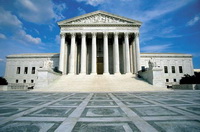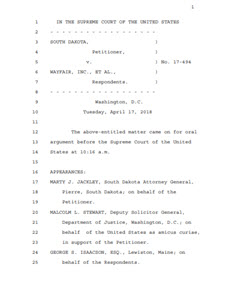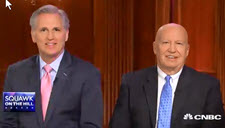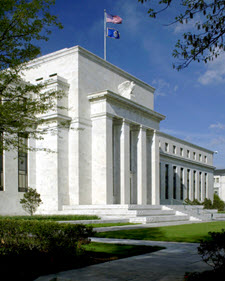The U.S. Supreme Court on Tuesday heard oral arguments on a long-awaited case (South Dakota v. Wayfair, Inc., No. 17-494 ) that addresses the constitutionality of states' authority to collect sales and use taxes on Internet consumer purchases from retailers who do not have a physical presence in a state.
 |
The U.S. Supreme Court heard oral arguments on a long-awaited case (South Dakota v. Wayfair, Inc., No. 17-494 ) that addresses the constitutionality of states' authority to collect sales and use taxes on Internet consumer purchases from retailers who do not have a physical presence in a state. |
The Wayfair case challenges two pre-Internet Supreme Court decisions from 1991 and 1967 (Quill Corp. v. North Dakota, 504 U.S. 298, and National Bellas Hess, Inc. v. Department of Revenue of Illinois, 386 U.S. 753, respectively). This pair of decades-old opinions exempts many internet merchants from collecting billions of dollars in sales taxes. The U.S. Government Accountability Office (GAO) estimates that state and local governments could have collected an estimated 8 to 13 billion dollars in 2017 if states were given authority to require sales tax collection from all remote sellers. (GAO report, Dec. 18, 2017).
During this week's oral argument on Wayfair, the nine justices offered divided views. For example, Justice Elena Kagan commented, "Congress is capable of crafting compromises and trying to figure out how to balance the wide range of interests involved here." Justice Sonia Sotomayor added, "Is there anything we can do to give Congress a signal it should act more affirmatively in this area?" (CQ, April 17)
Three justices – Neil Gorsuch, Clarence Thomas and Anthony Kennedy - have expressed a willingness in past writings to rethink the Court's case law in this area. On Tuesday, Justice Ruth Bader Ginsburg suggested now is the time for the Quill ruling to be corrected. Ginsburg asked, "If time and changing conditions have rendered it obsolete, why should the court which created the doctrine say, 'Well, we'll let Congress fix up what turns out to be our obsolete precedent?'" (Reuters and Wall Street Journal, April 17 / AP, April 18)
Justice Stephen Breyer also noted, "When I read your briefs, I thought absolutely right. And then I read through the other briefs, and I thought absolutely right. And you cannot both be absolutely right." (Bloomberg Law, April 17)
 |
During the Supreme Court's oral argument on Wayfair , the nine justices offered divided views. See transcript . |
Throughout decades of congressional efforts, legislation to level the tax playing field between Internet-based retailers and "brick and mortar" stores has never passed both chambers. More recently, President Trump has signaled his support for legislation authorizing states to impose sales tax collection requirements on online purchases. (Roundtable Weekly, Feb. 23)
The Roundtable joined The International Council of Shopping Centers, Investment Program Association, Nareit®, the National Association of REALTORS® , the National Multifamily Housing Council, NAIOP, the American Farm Bureau Federation and the South Dakota Farm Bureau Federation in filing an amicus curiae brief on March 5, urging the Justices to overrule the antiquated, pre-internet, "physical presence" test that imposes collection of sales and use taxes on traditional "brick-and-mortar" retailers – while exempting on-line retailers from those same obligations. The March brief re-iterated many points set forth by a real estate coalition in an initial amicus brief filed last November. (Roundtable Weekly, March 9, 2018 and Nov. 3. 2017)
On Wednesday, a USA Today editorial supported the real estate industry's viewpoint, while also including an opposing view. (USA Today, Tax Online Shopping Like All Others, April 17)
The Supreme Court is expected to render a decision in Wayfair by the end of June. (Wall Street Journal, April 17 and Roundtable Weekly, Jan. 12)
House and Senate GOP leaders signaled this week they intend to pursue legislation that would make permanent the individual tax provisions enacted as part of the Tax Cuts and Jobs Act (P.L. 115-97) enacted last December (Roundtable Weekly, Dec. 22, 2017)
 |
House Majority Leader Kevin McCarthy (R-CA), left, and House Ways and Means Committee Chairman Kevin Brady (R-TX) discussed the impact of recent tax reform; a possible phase 2 effort; the recent resignation of House Speaker Ryan; and the endorsement of McCarthy as his successor on CNBC’sSquawk on the Hill . |
Under current law, many of the individual provisions – including the lower effective tax rate on pass-through business income – will sunset after 2025. Although the nonpartisan Congressional Budget Office (CBO) projected last week that the tax bill would add 1.9 trillion dollars to the national debt over a decade, making permanent the cuts that lapse after 2025 could add an additional 1.5 trillion over the next decade, according to a Tax Foundation analysis. (Roundtable Weekly, April 13 and Reuters, April 17)
House Speaker Paul Ryan (R-WI) on Tuesday said, "We fully intend to make these things permanent, and that’s something we'll be acting on this year." (Reuters, April 17). Senate Majority Leader Mitch McConnell (R-KY) added, "If they are interested in making the individual rates permanent that’s something we ought to take a look at. I don’t know why we wouldn’t want to do that" (Politico, April 17)
In addition to making the individual provisions permanent, House Ways and Means Committee Chairman Kevin Brady (R-TX) has also floated making immediate business expensing permanent, among other changes. (Bloomberg, March 28 and Miller & Chevalier, DC TaxFlash, April 17)
Although prospects for passing what President Trump calls a "phase-two" tax cut bill in the House are possible, a Senate bill would require 60 votes for passage, which Democrats could prevent in the closely divided chamber. (CNBC, April 5)
Brady and House Majority Leader Kevin McCarthy (R-CA) on Tuesday discussed the impact of recent tax reform; a possible phase 2 effort; the recent resignation of House Speaker Ryan; and the endorsement of McCarthy as his successor on CNBC’s Squawk on the Hill .
After recently announcing his retirement from Congress when the current legislative session ends in early 2019, Ryan declared his support for McCarthy as the next GOP House Speaker. (Deloitte, April 13 and ABC News, April 13)
The next GOP House Speaker candidate must get 218 votes in a floor vote, which gives the 30-member conservative House Freedom Caucus leverage to propose one of their members for a leadership position. Such negotiations will be irrelevant if Republicans lose the House in the 2018 midterm elections. (USA Today, April 18)
Commercial real estate activity in the Fed's 12 regional districts show mostly positive results, yet concerns about trade tariffs are widespread, according to the Federal Reserve's latest "Beige Book" report about economic conditions. (The Fed, April 18)
 |
Commercial real estate activity in the Fed's 12 regional districts show mostly positive results, yet concerns about trade tariffs are widespread, according to the Federal Reserve's latest "Beige Book" report about economic conditions. (The Fed, April 18) |
A new focus on the threat of a trade war appears in the report, with the word "tariff" used 36 times, compared with zero references in the prior survey. The second line in the report states, "Outlooks remained positive, but contacts in various sectors including manufacturing, agriculture, and transportation expressed concern about the newly imposed and/or proposed tariffs." (Reuters, April 18)
The report summary also notes that steel and aluminum prices rose, "sometimes dramatically" due to the new duties imposed by the Trump Administration. (Roundtable Weekly, March 9) The Beige Book is one of the first official reports showing the economic impact of the new tariffs on domestic business. (Wall Street Journal, April 18)
Contacts in nine of the 12 districts commented directly on the impacts of tariffs, citing concerns related to rising prices, future uncertainty, investment decisions, and how to pass increased costs on to consumers.
A summary of each Fed district is included in the report, which shows economic expansion at a modest to moderate pace throughout March and early April, with the labor market described as "tight."
Although the Fed reports that commercial real estate activity and construction has improved since March, prices have increased for building materials, especially for lumber, drywall, and concrete. (GlobeSt, April 19)
The Fed will consider the Beige Book findings during its next meeting on May 1-2. On Monday, New York Fed President William Dudley said the Fed would likely rise interest rates three or four times in 2018. (Fed Calendar and CNBC, April 16)
Roundtable President and CEO Jeffrey DeBoer noted the commercial real estate industry's concerns earlier this month, stating, "Proposed tariffs, coupled with the earlier tariffs on steel and ongoing dispute with China could have unfortunate and unintended effects on the U.S. economy by raising construction costs, and reducing jobs in real estate development. China has continually taken advantage of trade practice laws, particularly intellectual property-vital for the U.S. to continue developing new technology, whether it be machinery, software, or energy efficient building solutions and should be held accountable but in a measured way." (Roundtable Weekly, April 6)
The economy and CRE will be a focus at The Roundtable's Spring Meeting next week in Washington, which will include Senate Majority Leader Mitch McConnell (R-KY) as a featured guest.